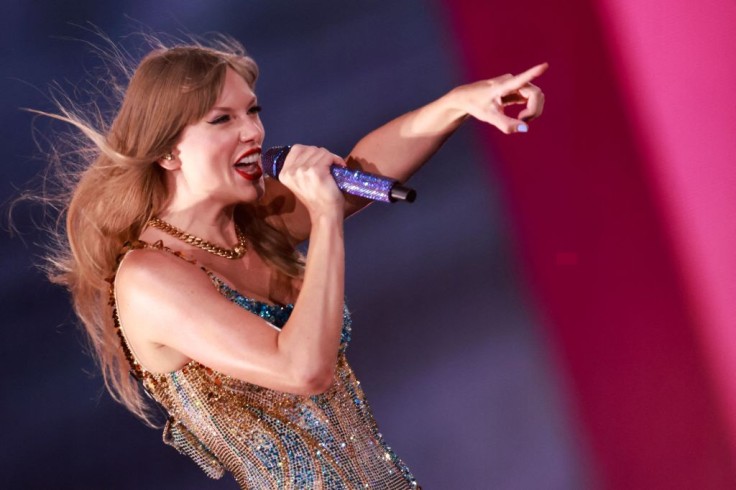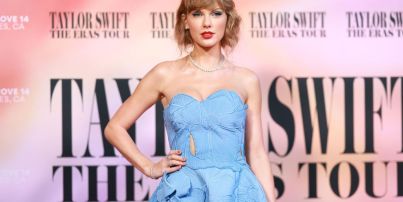
As reports of memory blackouts among fans at Taylor Swift "Eras" tour concerts continue to grow, Dr. Nathan Carroll is taking an in-depth look into the issue.
He has launched an extensive study to investigate what is being called the "Taylor Swift amnesia" phenomenon.
At a sell-out show in Los Angeles last month, Lorin Munchick and his family experienced the incredible atmosphere firsthand.
He was so impressed that he couldn't help but tell The Sun about it after the event.
On the other side of the States, teacher Danielle Collins felt compelled to share her story with them.
Dr. Carroll was intrigued by Danielle and Lorin's accounts, sparking his desire to explore the matter further.
After delving into the topic, he found the insights remarkable.
However, even when attending significant sports occasions, he had never experienced that same feeling of joyous unity they described.
Curious to discover other examples of people forgetting significant pivotal events, they stumbled upon a phenomenon known as transient global amnesia (TGA).
Such occurrences included concerts, weddings, birthdays, and important sporting events.
The National Institute of Health reports that transient global amnesia (TGA) is a form of short-term memory loss primarily affecting middle-aged and older adults.
It may be triggered by strenuous physical activity, mental stress, sexual intercourse, or migraines. Additionally, its onset tends to be quite sudden.
Research on the effects of TGA on younger people in situations such as highly charged music events is scarce, according to the statements of Doctor Carroll.
He was approached by two colleagues - Doctors Soha Salman and Stephanie Crane - who claimed to have suffered memory loss after attending a Taylor Swift concert.
Attendance at one the "Eras" tour concert allegedly causes physical effects, as the body releases cortisone and adrenaline.
These hormones disrupt the brain's ability to store memories briefly.
Dr. Carroll said to The Sun, "The brain can act erratically in certain situations."
He added that this phenomenon is more likely to be witnessed in older individuals concerned about their ability to remember details and think clearly as they age.
Based in New Jersey, the specialist noted that the occurrence rate among younger people is "three in 100,000," but events like concerts and sporting occasions are likely to cause this rate to spike.
According to him, women are more likely to suffer from the disorder than men.
READ ALSO : Taylor Swift Fans Criticized By Animal Protection Charity After Doing Disturbing TikTok Trend
While the exact reasons behind this remain a mystery, his opinion is that it could be linked to increased sensitivity towards cortisol and adrenaline.
"That's just my theory, though," said the expert, "We're not entirely certain yet."
This year, a potential paper presented at the American Psychiatric Association conference from Dr. Carroll of Jersey Shore University Medical Center speaks of an incident that occurred in 2023.
According to the report, news outlets reported massive cases of memory loss among Taylor Swift's fan base following her "Eras" tour concert.
A neurological disorder found in specific individuals is called "Blank Space," it is marked by periods of memory loss accompanied by inconsistent retrograde amnesia and persistent anterograde amnesia. These symptoms are similar to the ones observed with TGA, although it tends to occur more frequently among older people.
Nevertheless, there have been numerous reports that indicate younger concert-goers experience Blank Space, too.
Given the increasing attention given to cases of amnesia in the press, we determined that an overview of existing literature would be helpful from a clinical perspective.
He suggested that attending concerts might represent a situational hazard that temporarily raises the number of occurrences.
The link between TGA and events or activities such as musical performances, sexual intercourse, and marriage ceremonies is further reinforced through associations such as increased temperature, heightened emotions, arousal, activity levels, and alertness.
In summary, scientific studies and academic literature have supported the notion that TGA is caused by excitement and hormones.
This review also provides a further comprehension of this condition, making it especially useful for psychiatrists who often engage with young people presenting issues related to short-term memory loss.
To all Swifties out there recently worrying about potentially missing portions of their favorite artists' concerts, we advise them to take Taylor's advice and just "Shake it off."
© 2026 MusicTimes.com All rights reserved. Do not reproduce without permission.

![Tekashi 6ix9ine Targets Lil Durk's GF India Royale Online After Second Home Invasion [FULL STORY]](https://d.musictimes.com/en/full/95883/tekashi-6ix9ine-targets-lil-durks-gf-india-royale-online-after-second-home-invasion-full-story.jpg?w=103&h=103&f=21f3122f04fea6482ca51991c3c6c969)





